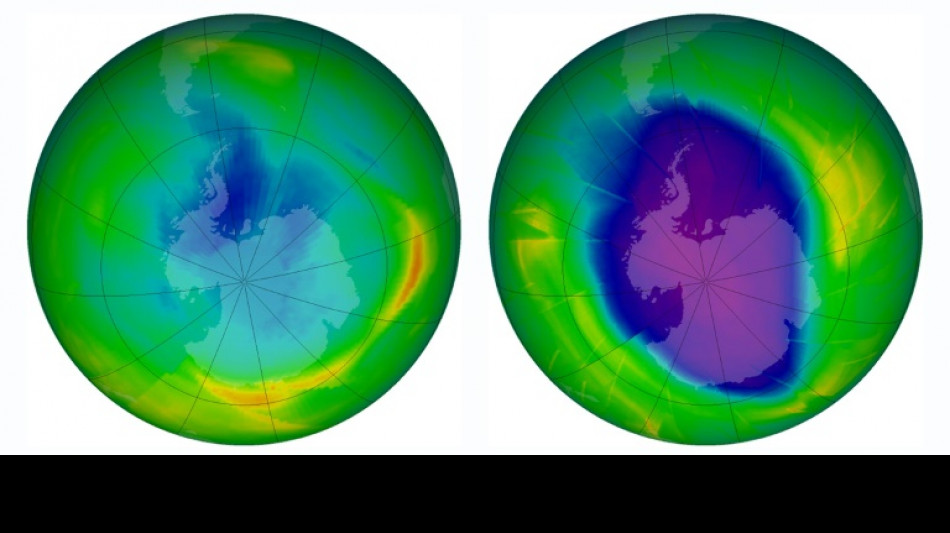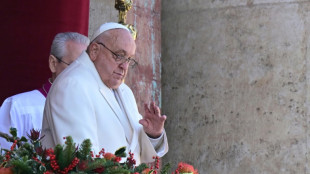
-
 Hungry Sabalenka ready for more Slam success
Hungry Sabalenka ready for more Slam success
-
Mass jailbreak in Mozambique amid post-election unrest

-
 Azerbaijani jet crashes in Kazakhstan, killing 38
Azerbaijani jet crashes in Kazakhstan, killing 38
-
Bridges outduels Wembanyama as Knicks beat Spurs

-
 2004 Indian Ocean tsunami: what to know 20 years on
2004 Indian Ocean tsunami: what to know 20 years on
-
Asia to mourn tsunami dead with ceremonies 20 years on

-
 Syrians protest after video of attack on Alawite shrine
Syrians protest after video of attack on Alawite shrine
-
Russian state owner says cargo ship blast was 'terrorist attack'

-
 38 dead as Azerbaijani jet crashes in Kazakhstan
38 dead as Azerbaijani jet crashes in Kazakhstan
-
Crisis-hit Valencia hire West Brom's Corberan as new boss

-
 Suriname ex-dictator and fugitive Desi Bouterse dead at 79
Suriname ex-dictator and fugitive Desi Bouterse dead at 79
-
35 feared dead as Azerbaijani jet crashes in Kazakhstan

-
 Pope calls for 'arms to be silenced' in Christmas appeal
Pope calls for 'arms to be silenced' in Christmas appeal
-
Syria authorities say torched 1 million captagon pills

-
 Pope calls for 'arms to be silenced' across world
Pope calls for 'arms to be silenced' across world
-
32 survivors as Azerbaijani jet crashes in Kazakhstan

-
 Pakistan air strikes kill 46 in Afghanistan, Kabul says
Pakistan air strikes kill 46 in Afghanistan, Kabul says
-
Liverpool host Foxes, Arsenal prepare for life without Saka

-
 Japan FM raises 'serious concerns' over China military buildup
Japan FM raises 'serious concerns' over China military buildup
-
Pope's sombre message in Christmas under shadow of war

-
 Zelensky condemns Russian 'inhumane' Christmas attack on energy grid
Zelensky condemns Russian 'inhumane' Christmas attack on energy grid
-
Sweeping Vietnam internet law comes into force

-
 Pope kicks off Christmas under shadow of war
Pope kicks off Christmas under shadow of war
-
Catholics hold muted Christmas mass in Indonesia's Sharia stronghold

-
 Japan's top diplomat in China to address 'challenges'
Japan's top diplomat in China to address 'challenges'
-
Thousands attend Christmas charity dinner in Buenos Aires

-
 Demand for Japanese content booms post 'Shogun'
Demand for Japanese content booms post 'Shogun'
-
As India's Bollywood shifts, stars and snappers click

-
 Mystery drones won't interfere with Santa's work: US tracker
Mystery drones won't interfere with Santa's work: US tracker
-
Djokovic eyes more Slam glory as Swiatek returns under doping cloud

-
 Australia's in-form Head confirmed fit for Boxing Day Test
Australia's in-form Head confirmed fit for Boxing Day Test
-
Brazilian midfielder Oscar returns to Sao Paulo

-
 'Wemby' and 'Ant-Man' to make NBA Christmas debuts
'Wemby' and 'Ant-Man' to make NBA Christmas debuts
-
US agency focused on foreign disinformation shuts down

-
 On Christmas Eve, Pope Francis launches holy Jubilee year
On Christmas Eve, Pope Francis launches holy Jubilee year
-
'Like a dream': AFP photographer's return to Syria

-
 Chiefs seek top seed in holiday test for playoff-bound NFL teams
Chiefs seek top seed in holiday test for playoff-bound NFL teams
-
Panamanians protest 'public enemy' Trump's canal threat

-
 Cyclone death toll in Mayotte rises to 39
Cyclone death toll in Mayotte rises to 39
-
Ecuador vice president says Noboa seeking her 'banishment'

-
 Leicester boss Van Nistelrooy aware of 'bigger picture' as Liverpool await
Leicester boss Van Nistelrooy aware of 'bigger picture' as Liverpool await
-
Syria authorities say armed groups have agreed to disband

-
 Maresca expects Man City to be in title hunt as he downplays Chelsea's chancs
Maresca expects Man City to be in title hunt as he downplays Chelsea's chancs
-
Man Utd boss Amorim vows to stay on course despite Rashford row

-
 South Africa opt for all-pace attack against Pakistan
South Africa opt for all-pace attack against Pakistan
-
Guardiola adamant Man City slump not all about Haaland

-
 Global stocks mostly higher in thin pre-Christmas trade
Global stocks mostly higher in thin pre-Christmas trade
-
Bethlehem marks sombre Christmas under shadow of war

-
 NASA probe makes closest ever pass by the Sun
NASA probe makes closest ever pass by the Sun
-
11 killed in blast at Turkey explosives plant


Ozone layer healing but imperiled by schemes to curb Sun's heat
The ozone layer that shields life on Earth from deadly solar radiation is on track to recover within decades, but controversial geoengineering schemes to blunt global warming could reverse that progress, a major scientific assessment warned Monday.
Since the mid-1970s, certain industrial aerosols have led to the depletion of ozone in the stratosphere, 11 to 40 kilometres (7 to 25 miles) above Earth's surface.
In 1987, nearly 200 nations agreed on the Montreal Protocol to reverse damage to the ozone layer by banning chemicals that destroy this naturally occurring stratum of molecules in the atmosphere.
That agreement is working as hoped, and is in line with previous projections, more than 200 scientists found.
"Ozone is recovering, this is a good story," John Pyle, a professor at the University of Cambridge and co-chair of Scientific Assessment of Ozone Depletion, told AFP.
The ozone layer should be restored -- both in area and depth -- by around 2066 over the Antarctic region, where ozone depletion has been most pronounced, according to the report, jointly released by the World Meteorological Organization (WMO), the UN Environment Programme, and government agencies in the US and the European Union.
Over the Arctic, full recovery will happen around 2045, and for the rest of the world in about 20 years.
An intact ozone layer filters out most of the Sun's short-wave ultraviolet radiation, which damages DNA in living organisms and can cause cancer.
At ground level, however, ozone is a major component of air pollution and exacerbates respiratory disease.
Efforts to repair the ozone layer intersect with the fight against global warming.
- Like a volcano -
The phase-out of ozone-depleting substances -- some of them powerful greenhouse gases -- will have avoided up to one degree Celsius of warming by mid-century compared to a scenario in which their use expanded some three percent per year, according to the assessment.
A class of industrial aerosols developed to replace those banned by the Montreal Protocol also turned out to be powerful greenhouse gases, and will be phased out over the next three decades under a recent amendment to the 1987 treaty.
But while the world pulled together to tackle the damage to the ozone layer, it has failed to curb carbon emissions quickly enough to forestall dangerous warming.
A world barely 1.2C above pre-industrial levels has already been buffeted by record heatwaves, droughts and temperatures, and is headed for a disastrous 2.7C above that benchmark.
With emissions continuing to rise and time running out to avoid some of the worst impacts, controversial geoengineering schemes are moving to the centre of climate change policy debates.
These include proposals to blunt global warming by depositing sulphur particles into the upper atmosphere.
But the report cautioned this could sharply reverse the recovery of the ozone layer.
So-called stratospheric aerosol injection (SAI) is increasingly seen as a potential stop-gap measure for capping temperatures long enough to tackle the problem at the source.
Nature demonstrates that it works: the violent 1991 eruption of Mount Pinatubo in the Philippines -- which spewed millions of tonnes of dust and debris -- lowered global temperatures for about a year.
- Unintended consequences -
Scientists calculate that injecting 8 to 16 million tonnes of sulphur dioxide into the stratosphere each year, roughly equivalent to Pinatubo's output, would cool Earth's temperature by about 1C.
Simulations over Antarctica in October -- when the ozone hole is biggest -- show that so-called stratospheric aerosol injection over 20 years would lower global temperatures by 0.5C.
But there's a trade-off: the ozone layer would be reduced to its 1990 levels, only a third of what it was before the impact of human activity.
The world would see "a continuing severe depletion of ozone while such solar radiation management continues," Pyle said.
The UN's climate science advisory panel, the IPCC, has warned of other unintended consequences, ranging from the disruption of African and Asian monsoons, upon which hundreds of millions depend for food, to a drying of the Amazon, which is already transitioning toward a savannah state.
The new report, the 10th to date, also highlights an unexpected decline of ozone in the lower stratosphere over the planet's populated tropical and mid-latitude regions.
Up to now, chlorofluorocarbons, or CFCs, and other molecules have mainly eroded ozone in the upper stratosphere, and over the poles.
Scientists are investigating two possible culprits: industrial chemicals not covered by the Montreal Protocol called "very short-lived substances" (VSLSs), and climate change.
X.Karnes--AMWN


